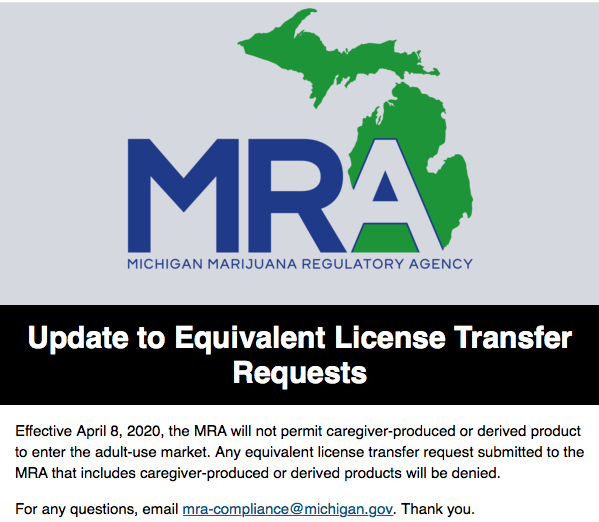MRA Suddenly Changes Policy on Equivalent Transfers Between Medical and Adult-Use Licenses

On April 8th, 2020, Michigan’s Marijuana Regulatory Agency (MRA) issued another sudden policy change that may drastically impact Michigan’s cannabis supply: external transfers of caregiver products from medical marijuana facilities can no longer be brought into the adult-use market.
In other words, medical marijuana facilities can only engage in “equivalent transfers” of inventory if the product was grown in-house. The MRA announced the change by issuing an MRTMA Advisory Bulletin titled, “Transfer of Marijuana Between Equivalent Licenses”, and a separate email notification:

The MRA also revised the existing MMFLA Advisory Bulletin, “Guidance on the Phase-Out Process Ending External Transfers to the Regulated Market,” which was discussed in greater detail here.
The Equivalent Transfer Rule
The process for transferring marijuana product inventory from a licensed medical marijuana facility to a licensed adult-use establishment is outlined in the current Emergency Rules. Under MRTMA Emergency Rule 40, growers, processors, and commercial storefronts (provisioning centers and retailers) may transfer inventory from medical to adult-use.
However, the rules also grant the MRA the ability to create additional guidance and to set specific start and end dates, as well as other transfer requirements.
Initially, in November 2019, the MRA published guidance allowing growers, processors, and provisioning centers to transfer a greater amount of inventory from the medical to the adult-use marijuana market. At first, up to fifty percent (50%) of finished product inventory that passed testing was allowed to become adult-use inventory.
There were no additional restrictions depending on whether the product was grown by the licensed facility or a caregiver. The only other limitation on equivalent transfers was that the product at a provisioning center needed to remain in inventory for a minimum of thirty (30) days until the transfer.
Restrictions on Equivalent Transfers
In late December 2019, the MRA announced that licensed facilities could only bring in marijuana flower (bud, shake, trim) from caregivers as external transfers, effective Mar. 1st, 2020. This change had a significant impact on the supply chain for both medical and adult-use businesses, since other caregiver products that were previously obtained by licensed facilities could no longer be transferred into the system.
On Mar. 11th, 2020, the MRA issued further guidance that added additional restrictions on the amount of inventory that could be transferred between medical and adult-use licenses under common ownership. These additional restrictions only allow growers to transfer fifty percent (50%) of inventory from medical to adult-use every sixty (60) days.
The MRA also placed additional restrictions on provisioning centers ,which may now only transfer fifty percent (50%) of product once every thirty (30) days (as long as the inventory has been there for a minimum of thirty (30) days).
Sudden Prohibition on External Caregiver Transfers to the Adult-Use Market
As of April 8th, 2020, equivalent transfers of external caregiver products into the adult-use market are prohibited. The MRA did not provide any additional explanation. However, as a result of the MRA’s drastic change, the entire cannabis supply chain in Michigan has been disrupted.
Licensed medical facilities will continue to create product in-house, which can be supplemented by a limited amount of caregiver product via external transfers until those are phased out in late 2020.
However, in order to more quickly infuse the adult-use market with product, many operators with equivalent licenses were likely maximizing the volume of transfers into their adult-use inventory in order to satisfy demand.
These transfers likely contained a significant amount of caregiver product obtained by external transfers. In fact, there are some reports that approximately sixty percent (60%) of the licensed cannabis product sold in Michigan originated from caregivers.
In any event, this practice can no longer be relied upon to increase supply on the adult-use market, which will lead to a decrease in the overall supply in Michigan until more licensees are open and operational.
With the new policy in place, existing licensed MMFLA and MRTMA businesses will now have to adjust accordingly, in reaction to the sudden disruption of the MRA’s sudden prohibition on externally transferring caregiver product supply into the adult-use market.
During these times, we remain as committed as ever to serve you for your cannabis business needs. We are available remotely by phone or by Skype. For more information, please contact our team of experienced cannabis attorneys and support staff by filling out this form, or by calling our office at (248) 541-2600.
Categories
Cannabis Legal Group Free Consultation
Get in Touch With Michigan's Most Trusted Cannabis Law Firm
We’ve Been Helping Michigan Marijuana Businesses Lay the Groundwork for Long-Term Security and Success for Years, and We Can Help You, Too.
Phone Number:
(248) 301-0626
© Cannabis Legal Group. All rights reserved.

